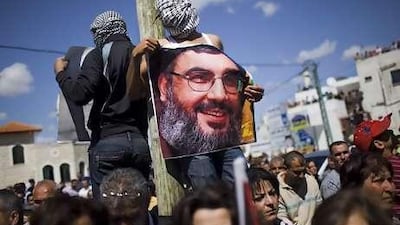When Hizbollah starts taking a keen interest in its country's economy, you know that something is afoot. This is because the Lebanese Shia party - which receives hundreds of millions of dollars from Iran each year and substantial contributions from private donors in the Lebanese Shia community, including a wealthy African diaspora - has long operated within its own insulated economic framework. This safety blanket has allowed it to take the country to war with Israel in 2006 and pay for the damage inflicted on its constituents, and bring business to standstill in central Beirut for 18 months between November 2006 and June 2008 with a mass sit-in by demonstrators on the party's payroll.
On May 7 2008, it tried to topple the pro-western government of Fouad Seniora and, while that didn't actually cost it anything, the effects on Lebanon's brand equity weren't a consideration. The Lebanese are by and large divided on Hizbollah. They fall into three camps. One sees the Party of God as having a higher calling in confronting and eventually defeating the Zionist enemy and that all other considerations - a robust and vibrant economy with prosperity for all, for example - are secondary.
The second believes that until Lebanon has a strong enough army, only Hizbollah can defend it against Israeli aggression, while the third sees Iran maintaining an army in Lebanon to do its bidding in a stand-off with the "Great Satan", as the US has been dubbed. Whichever way you look at it, it's bad for business. Property development aside, Lebanon, with its woeful infrastructure, would have a hard enough time attracting foreign direct investment without having what is arguably the region's best-trained and equipped fighting force on a constant war footing.
The prime minister, Saad Hariri, is still popular but toothless. The Saudi government has told the 40-year-old son of Rafik Hariri, the assassinated former Lebanese premier, that he mustn't rock the boat. That could scupper the kingdom's new understanding with Syria, a country that has always had historic designs on Lebanon, and one which Riyadh wants to knock out of Iran's orbit. Hizbollah, meanwhile, has the weapons and Syria's ear. It also knows that the predominantly Alawite regime in Damascus is historically very chummy with Shia Iran, not least because the Alawites, a Shia splinter sect, are a minority in Syria.
Thus Lebanon is a Petri dish in which a culture of the region's Sunni-Shia rivalry was developing nicely. Then the so-called Freedom Flotilla incident happened. Literally overnight, Sunni Turkey became the defender of the Palestinian cause. The Saudis cozied up. So did Syria, which will never pass on an opportunity to get chummy with its most powerful neighbour (one must also be realistic, after all).
Until that moment Hizbollah was the undisputed champ when it came to bloodying Israel's nose. Now all it could do was condemn the incident and hold symbolic funerals for the dead. It needed to once again be relevant. It needed another cause. It found one. Last month, Israel announced it had completed mapping underwater sites within its territorial waters that held an estimated 24 trillion cubic feet of gas, worth about US$15 billion (Dh55.09bn).
The presence of natural gas deposits off the eastern Mediterranean is not new. Everyone knows the gas is there and any exploitation of reserves in Lebanese waters could help pay off its national debt of $52bn. But the Lebanese have been too busy taming their predisposition to self-destruct to do anything about it, or any other economic priority for that matter. This time, however, there are concerns that Israel's potential exploitation of its gas could stray into Lebanese territory.
So far, there has been no evidence to suggest Israel will encroach but tensions between the two, which have been in a technical state of war since 1948, run high. As far as Hizbollah was concerned the "Resistance" had suddenly gone naval. Hizbollah and to a lesser degree Amal can make wonderful political hay out of this recent development. Israel has always been portrayed as coveting Lebanon's natural resources, especially its water (a natural asset the Lebanese state has been woefully inept at harnessing).
There is evidence Israel has tried, unsuccessfully, to divert some areas of the Litani River to irrigate its northern settlements, so it would not be hard to convince the eternally conspiracy-centric Lebanese that the Zionists now want our gas. Hizbollah is skilled at staying in the game. In 2000, after Israel withdrew from its self-declared security zone in southern Lebanon, the party pulled out its maps and brought Lebanon's attention to Shebaa Farms, a still-occupied rocky outcrop.
No one quite knows who owns the Shebaa. Is it Syrian? Is it Lebanese? The debate rages, but Hizbollah doesn't care. Now it appears we have Shebaa sur (or rather sous) Mer and a debate ripe to further exploit the Sunni-Shia divisions in Lebanon. It has already started and goes something like this: the pro-Syrian/pro-Iranian/anti-Israeli opposition (which in Lebanon holds the real power) is using the gas incident as an excuse to accuse the pro-US majority (which, apart from a slim parliamentary advantage and Saudi cover, has no real power) of letting Israel once again plunder Lebanon's natural resources.
Both sides have entered the fray. Mr Hariri has said "Israel can do nothing but threaten and frighten the Lebanese", while Gebran Bassil, the energy minister whose Free Patriotic Movement is an ally of Hizbollah, has warned Israel Lebanon will not tolerate illegal exploitation. For Israel's part, Uzi Landau, a spokesman, has said in response to Hizbollah's drumbeating it would not hesitate to use force to protect its natural resources. The game, it would appear, has already begun.
Michael Karam is a Beirut-based media and PR consultant business@thenational.ae

